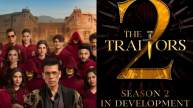It’s not easy to like Danny Boyle’s 28 Days Later series, unless you choose to be patient. If you do, the latest in the series is rewarding in unexpected ways. The characters are memorable when they choose to be.
My favourite is not the child protagonist Spike (Alfie Williams), though he is a prized find, no doubt. But the best funniest lines in this frequently tedious but sporadically brilliant apocalyptic zombie film is a Swedish character named Erik who comes in the second-half equipped with quips.
Erik, played by the Swedish actor Edvin Ryding, who is the comic relief in this meditative monster movie with flesh-eating zombies who crawl all over the scenic Scottish hinterland, gets a closure he doesn’t deserve.
It is a strange and piercing dichotomy: the panoramic landscape—shot by cinematographer Anthony Dod Mantle as though there is no tomorrow—and the acute violence of an annihilated civilization with nothing remaining, not even any shred of hope.
Danny Boyle, whom we know and partially love for putting Mumbai’s slums on the world map, is here in complete control of his characters, although not so much their travel plans. The plot tends to go haywire at times, juggling between the jugular and the bizarre, with many episodes in the storytelling spiralling out of sync with the complete picture.
But the main plot of a virus infecting civilization on the mainland and a family coming apart on an island away from the mainland, is injected with substantial sagacity and warmth. In the first-half, Spike is accompanied by his father Jamie (Aaron Taylor-Johnson) to the infected mainland to initiate the boy into the deadly danger that awaits them.
This half is unremarkable even when the jumpstarts grab your attention.
It’s the second-half that comes alive with a spluttering and splattering wave of bloodied violence as Spike takes his ailing mother across from the safety of the secluded island to the queer ghoulishness of the mayhem-maddened mainland. It is here that the film’s ‘skull’-ful portrait of Nature’s barbaric caprice unfolds with significant savagery and sensitivity.
Danny Boyle spares us none of the violence of a wounded civilization. And yet there is a discernible gentleness in the heartwarming images of a young son parenting his own mother Isla (Jodie Comer, tactile, touching and terrific), taking her to meet the only surviving doctor Kelson (a very fine Ralph Fiennes) who spends his time suspended from civilization in the quest of constructing a pyramid of skulls of those who perished by infection and inflexion.
The metaphor of the skulls as a manifestation of the violence that has grips Danny Boyle’s universe, is acutely tragic and expressive. There are times towards the end when the mother-son equation erases the excesses of tormenting turpitude that flash across the screen in whimsical whiplashes of wickedness.
The storytelling is torn between the trauma of living in the torment of today and the beauty of the past. 28 Days Later is all heart, some of it ripped off and on display right in front of our nauseous selves.
Also Read: Sana Khan Devastated By Mother’s Death, Seen Inconsolable In Ambulance; Emotional Video Surfaces












